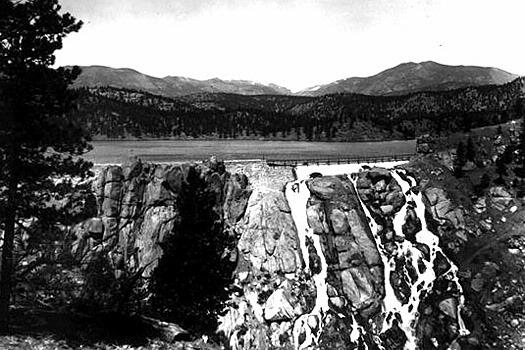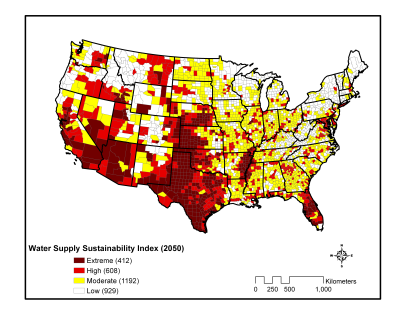The week that was, 7/18-24/2010
Posted on | July 25, 2010 | No Comments

"The first time I pulled back the bushes and saw a spring, I knew those magical places would be a permanent part of my life. Our area (north Florida) offers one of the greatest natural wonders on earth. It is a giant, three-dimensional karst terrain that produces a renewable resource.... the finest water on the planet. I can think of no place on the planet more worthy of my attention and love than my own backyard." -- Photographer Wes Skiles, who died last week in a diving accident. Click on the image to be taken to his essay at Florida Springs.com
The man who had filmed where no one had before – whether in the underwater caves of North Florida or on assignment for National Geographic in the blue holes of the Bahamas – died Wednesday in a diving accident off Palm Beach.– Photographer Wes Skiles brought Florida waters to world, Ocala Star-Banner, July 23, 2010
His last story for us, Bahamas Blue Holes, made the August 2010 cover. It’s a testament to Wes’s photographic skills, courage and child-like wonder in the search for the unknown. — National Geographic photo editor Kurt Mutchler, July 22, 2010
“I do not believe that the deep-water offshore rigs that were mobilised to international locations during the suspension will return to the gulf [of Mexico] for some time, if at all.” — Halliburton chief executive Dave Lesar, Rigs head for new waters as owners count cost of freeze, Financial Times, July 21, 2010

Burst dam on Lake Delhi, Iowa. Source: Des Moines Register / Christopher Gannon. Click on the image for a full report and video from the Register.
“The lake’s gone.” — Irv Janey, a resident near Lake Delhi, Iowa, created in the 1920s by a hydroelectric dam that failed Saturday night, Will dam failure be end of Lake Delhi?, Des Moines Register, July 25, 2010
“You have to tie yourself off, onto the rock, while you hold onto the jackhammer. Otherwise, you sink.” — Underwater construction contractor Spencer Dell, Underwater undertaking to fix Cheesman Dam almost underway, Denver Post, July 24, 2010
The flood is the biggest challenge the Three Gorges Dam has faced since its completion … — Water levels to rise to highest in half a century, South China Morning Post, July 20, 2010

First water over Cheesman Dam spillway. Source: Denver Water. Click on the image to be taken to a full historical photo gallery.
In June, 2003, while the dam was still being built, Xinhua said it would be able to contain a “once-in-10,000-years flood”. By May, 2007, that claim had shrunk to a flood that would come “once a millennium”, and by October 2008 the state mouthpiece was referring to the dam stopping just “once-in-a-century floods”. By Tuesday, China Central Television had further downgraded the dam’s role to having “limited flood-protection ability”. — From hubris to humble pie: dam boosters mocked, South China Morning Post, July 24, 2010
Pricing works if the price differential between low users and high users is more than a little noticeable. — Cheap, ignored and wasted, Ocala Star-Banner, July 20, 2010

Photographer Wes Skiles, who died in a diving accident last week, took the August 2010 cover photo for National Geographic. Click on the cover to be taken to the story.
“It would obviously devastate water supplies.” — Roger Patterson, assistant general manager of the Metropolitan Water District of Southern California on a study by the State Water Resources Control Board concluding that 75% of the water in the San Joaquin-Sacramento River system would need to flow into the San Francisco Bay for native fish to recover, Delta survival requires major cutbacks in water use, state study finds, Contra Costa Times, July 21, 2010
“The (report) is a purely theoretical exercise with no application in the real world.” — Dan Nelson, executive director of the San Luis & Delta Mendota Water Authority on the same report, Delta in need of water: Too much being diverted to reverse lengthy decline, Stockton Record, July 22, 2010

A Tetra Tech-Natural Resources Defense Council report "Evaluating Sustainability of Projected Water Demands under Future Climate Change Scenarios, July 2010" found that 70% of counties in the US may be at risk to climate change, and approximately one-third of counties may be at high or extreme risk, including the Southwestern US. Click on the map to be taken to Tetra Tech
Projected decreases in available precipitation from historical records will also vary: most areas will experience only slight decreases—drops of less than 2.5 inches per year between 2005 and 2050—with some regions, such as east Texas, the Lower Mississippi Basin, California Central Valley, and the Southeastern U.S., experiencing decreases of more than 5 inches per year by 2050. — Climate Change, water and risk, Natural Resources Defense Council, July 2010
“Until you actually see the dollars, it’s very difficult to see how it would be in the best interest of ratepayers or not.” — Michael Kenney, executive director, Pittsburgh Water and Sewer Authority, Pittsburgh weighs water privatization, Pittsburgh Tribune-Review, July 20, 2010

"An elliptical aeration pond at a water treatment facility in Arkansas appears from above like a circumscribed collection of specimens, a giant tray of disembodied breasts or eyeballs, each pale white round punctuated in the center with a darker nub," writes Leah Ollman in the Los Angeles Times about an exhibit of photos by Emmet Gowin. Click on the pond to be taken to the Times article.
Under a new amendment to Penal Code No. 16 for the year 1960, Article 456 was cancelled and replaced with a new one, Paragraph B, which stipulates that individuals found guilty of stealing water from main or domestic networks, sabotage of these networks, illegal pumping or tampering with water meters will be imprisoned for three to 12 months and fined JD100-JD500. — Culprits in water theft cases face fines, jail, Jordan Times, July 21, 2010
“We have enough water. We just don’t have it at the right time.” — Selectman Rick Murray, Water bans may restore herring run, Boston Globe, July 22, 2010
“At least it’s not radioactive.” — Frank Crisci, mayor of Wales, Alaska, on local creek water, High uranium levels found in Wales water, Alaska Daily News, July 17, 2010*
Germany is probably the only country in the world which monitors not just water consumption by its citizens but also the quantity of sewage generated. — Water evangelist inspires many, Mumbai Daily News & Analysis, July 24, 2010
For a full round-up of California water news, go to Aquafornia, the newsfeed of the Water Education Foundation, or to UC Berkeley’s On Water. For San Diego water news, try Groksurf’s San Diego. Or, for all things fresh water, do check in with WaterWired.
This post has been updated. The Lake Delhi item was added at 4pm, 7/25/2010.
Comments
Leave a Reply



